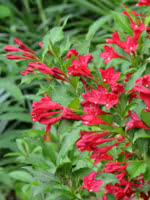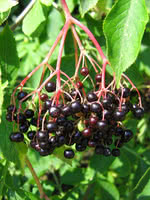Mon-Fri 9am - 5pm Mountain time
Black Elderberry vs Red Prince Weigela
Weigela florida Red Prince
Sambucus canadensis
NOT AVAILABLE THIS SEASON - MIGHT RETURN
NOT AVAILABLE THIS SEASON - MIGHT RETURN
Red Prince Weigela should be the next flowering shrub you add to your yard. Vibrant red tubular blooms flower two times per season, once in spring and again in late summer.
This shrub is versatile, deer and rabbit resistant, and drought tolerant once established. Try planting Red Prince Weigela as a specimen plant or for your next border/hedge.
Black Elderberry is a deciduous shrub native to eastern North America. You can plant this shrub in moist areas and it will help stabilize your soil. You can also use it on rural properties anywhere you'd use a lilac.
Black Elderberries are considered to be partially self-pollinating. So while they will still produce some berries without cross-pollination, planting with another variety will increase yields. Consider planting with Ranch Elderberry or Bob Gordon Elderberry.
Warning: the seeds, stems, leaves, roots, and uncooked berries of the Black Elderberry are poisonous to humans when eaten in quantity. You should cook the berries to make them safe for human consumption.
Red Prince Weigela Quick Facts
Black Elderberry Quick Facts
Toxicity: leaves, stems, and uncooked berries are poisonous to humans

